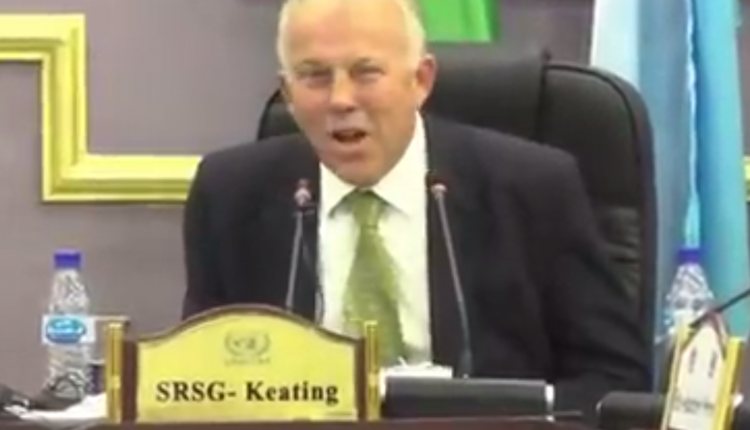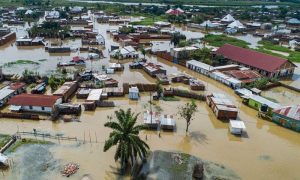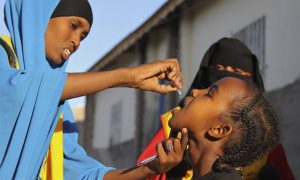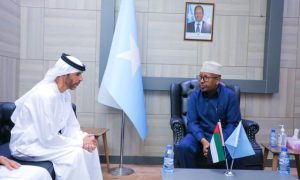
The Somalia Star | By The Star Staff Writer | MOGADISHU – The outgoing UN envoy to Somalia has struck up friendships with “many, many” Somalis during his three-year term. He is excited about his contribution to the country’s achievements that helped it avert famine last year. But there’s one thing, he said, he would miss very much: Somalis’ world that’s swarming with “conspiracy theories.”
“I think this is what I am gonna miss the most, is all the conspiracy theories, “ Michael Keating said earlier this month in the coastal Somali city of Kismayo, where he attended a gathering that brought together the country’s five regional administrators.
As the participants erupted in laughter and applause, Keating continued: “You know, everything you do or say everyone reads into it some wonderful conspiracy theory that shows the great imagination of Somalis. And these conspiracy theories (chuckling), if you could make money out of them, this (Somalia) would be a very rich country.”
Keating’s participation in the Kismayo meeting, which was boycotted by the nation’s central government in Mogadishu, has provoked strong reactions from many Somalis who saw it as an attempt by the world body to encourage the balkanization of their country. Mogadishu considers the regional chiefs as a team that cast in its lot with foreign countries that are wont to bankroll rogue politicians in the country.
But Keating said the Kismayo gathering was for him “an opportunity” to “meet” all regional chiefs and “say good bye” to them.
It was, he said, “irresistible.”
In his 14-minute-long address, Keating was effusive in his praise for Somalia and Somalis, saying since his arrival three years ago, “a number of extraordinary changes have taken place” in the country — “sometimes for good reasons, sometimes for bad reasons.”
“So often we’re focused on the day today politics. We tend to see what’s going wrong. We tend to see all the problems — and that is correct,” he said. “ But occasionally, it’s very important to step back, as it’s my privilege now because I am leaving, and just remind ourselves of the progress that has been made. And that progress over the last five years or so has been truly remarkable.”
He, however, said distrust among Somali politicians and the lack of functioning institutions could hold back the country’s efforts to recover from decades of conflict and lawlessness.
“Unity among Somali political leaders will allow this country to do almost anything,” he said. “It is a rich country: The rivers, the oceans, the fish, the livestock, the people, the energy, the sun. It’s a rich country.”
Keating — a former associate director at Chatham House in London, the UK’s leading think tank on international affairs — said it was a “huge privilege” for him to work in Somalia.
“I’ve learnt so much,” he said, adding that within a week after his arrival in the capital, Mogadishu, he met with all principle political actors in the country: The president, the prime minister, ministers, parliament speaker, deputy speaker and regional administrators.
“I consider that I am leaving Somalia with friends, and what more could be important than that, what (is) more important than that,” he repeated, adding that he will “stay in touch” with those “many, many friends.”
He said it was a “privilege” for him to have contributed “to the renewal of Somalia” to get it to a point where its “amazing potential” could be realized.
“Somalis are amazing, by the way, if you didn’t know this. You’re amazing people. You’re very entrepreneurial, (applause) you know, very creative, but, you’re also, each of you is sovereign, each of you is a very fierce individual, each of you wants to protect what’s yours,” he said. “To move forward, we’ve to kind of pull our efforts and build unity and somehow find a way to improve the lives of ordinary Somalis. You know, and I’ve been seeing some of them this morning. That is the ultimate test, is improving the lives of so many Somalis.
“I mean, given how talented and rich Somalia is, it’s a shame that so many people are living in poverty, there are so many displaced people, there are so many problems, so getting the politics right is gonna be key to solving those problems,” he said.
He said during his term he had visited almost all the major regions in the country.
“This country is changing very fast. It’s urbanizing very fast,” he said. “There’s a lot more economic activity. There is a lot more going on than we imagined. There is a lot more investment. I think business confidence is going up. So there’s some very positive things happening,” such as the spike in revenue from taxes in regional administrations.
He said one of the major achievements registered in Somalia was to avoid famine last year.
“That is incredible,” he said. “Let’s not forget this kind of very big achievements.”
He said his successor, Nicholas Haysom of South Africa, would be “a very good guy.”
“By the way, I think you’re gonna like” him,” he said.
Haysom, 66, will take office on Oct. 1. Prior to his appointment, Haysom was the UN envoy for Sudan, South Sudan and Afghanistan.
.
.
.
Xafiiska Wararka Qaranimo Online | Muqdisho
________________________________________________________
_____________________________________________________________________________________
Xafiiska Wararka Qaranimo Online | Mogadishu, Somalia
_____________________________________________________________________________________Advertisement
_____________________________________________________________________________________







